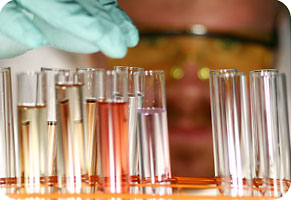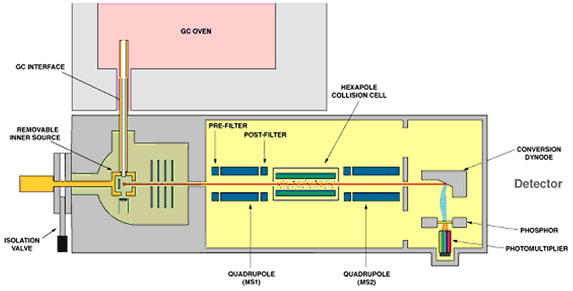Pesticide Testing
Isotope Dilution GC/MS/MS Pesticide Testing

ALS Environmental offers the analysis of organochlorine pesticides by isotope dilution Gas Chromatograph/ Mass Spectroscopy/Mass Spectroscopy (GC/MS/MS), using our new Waters Quatro triple quadrapole.
It is well known that the analysis of organochlorine pesticides by traditional EPA methodologies that use Gas
Chromatographs with Electron Capture Detectors (GC/ECD) are often affected by the presence of PCB congeners (polychlorinated biphenyl congeners) and other co-extractable interferences causing false positive identification and/or over estimation. High biased results for organochlorine pesticides can lead to an overall lack of data confidence and unnecessary environmental actions.
To eliminate co-extractable and PCB congener interference, ALS Environmental has developed a unique method using isotope dilution with Large Volume Injection (LVI) and GC/MS/MS. Using standard extraction procedures combined with this analytical method, ALS Environmental is able to achieve detection levels up to 20 times lower than typically observed by ECD detection.
The triple-quad LVI/GC/MS/MS provides excellent selectivity in complex matrices by generating unique spectral fingerprints. These fingerprints provide unambiguous identification producing increased data defensibility. This enhancement is essential in further reducing co-extractable interferences. Isotopic standards increase the precision and accuracy in measuring the concentration of the pesticides. This method is applicable to water, soil/sediment and tissue matrices.

Method Detection Limits and Method Reporting Limits
| ORGANOCHLORINE PESTICIDES | ||||||
|---|---|---|---|---|---|---|
| WATER | SOIL | TISSUE | ||||
| Compound | MDL (ng/L) | MRL (ng/L) | MDL (μg/Kg) | MRL (μg/Kg) | MDL (μg/Kg) | MRL (μg/Kg) |
| alpha-BHC | 0.27 | 0.5 | 0.0069 | 0.05 | 0.025 | 0.1 |
| gamma-BHC | 0.15 | 0.5 | 0.011 | 0.05 | 0.041 | 0.1 |
| beta-BHC | 0.31 | 0.5 | 0.012 | 0.05 | 0.035 | 0.1 |
| delta-BHC | 0.19 | 0.5 | 0.011 | 0.05 | 0.047 | 0.1 |
| Hexachlorobenzene | 0.13 | 0.5 | 0.015 | 0.05 | 0.032 | 0.1 |
| Heptachlor | 0.17 | 0.5 | 0.0091 | 0.1 | 0.014 | 0.1 |
| Chlorpyrifos | 0.17 | 0.5 | 0.0072 | 0.05 | 0.023 | 0.1 |
| Aldrin | 0.47 | 1 | 0.012 | 0.1 | 0.047 | 0.1 |
| Octachlorostyrene | 0.28 | 1 | 0.017 | 0.1 | 0.094 | 0.1 |
| Isodrin | 1.1 | 2 | 0.029 | 0.2 | 0.043 | 0.2 |
| Oxychlordane | 0.72 | 2 | 0.14 | 0.2 | 0.18 | 0.50 |
| Heptachlor epoxide | 0.47 | 1 | 0.03 | 0.1 | 0.048 | 0.1 |
| 2,4’-DDE | 0.19 | 0.5 | 0.0069 | 0.05 | 0.026 | 0.1 |
| gamma-Chlordane | 0.2 | 1 | 0.0081 | 0.05 | 0.024 | 0.1 |
| alpha-Chlordane | 0.15 | 0.5 | 0.0066 | 0.05 | 0.047 | 0.1 |
| trans-Nonachlor | 0.24 | 0.5 | 0.014 | 0.05 | 0.025 | 0.1 |
| Endosulfan I | 1.2 | 2.0 | 0.05 | 0.2 | 0.094 | 0.2 |
| 4,4’-DDE | 0.13 | 0.5 | 0.0055 | 0.05 | 0.049 | 0.1 |
| 2,4’-DDD | 0.11 | 0.5 | 0.0094 | 0.05 | 0.035 | 0.1 |
| Dieldrin | 2.3 | 5.0 | 0.098 | 0.5 | 0.073 | 0.5 |
| Endrin | 0.84 | 2.0 | 0.045 | 0.2 | 0.12 | 0.5 |
| 2,4’-DDT | 0.13 | 0.5 | 0.015 | 0.05 | 0.048 | 0.1 |
| cis-Nonachlor | 0.31 | 2.0 | 0.015 | 0.2 | 0.049 | 0.2 |
| 4,4’-DDD | 0.2 | 0.5 | 0.015 | 0.05 | 0.028 | 0.1 |
| Endosulfan II | 0.51 | 2.0 | 0.043 | 0.1 | 0.14 | 0.5 |
| Endrin aldehyde | 0.67 | 2.0 | 0.051 | 0.1 | 0.082 | 0.2 |
| 4,4’-DDT | 0.23 | 0.5 | 0.014 | 0.05 | 0.043 | 0.1 |
| Endosulfan sulfate | 0.12 | 0.5 | 0.017 | 0.05 | 0.039 | 0.1 |
| Methoxychlor | 0.16 | 0.5 | 0.018 | 0.05 | 0.026 | 0.1 |
| Endrin Ketone | 0.7 | 2 | 0.036 | 0.1 | 0.13 | 0.5 |
| Mirex | 0.12 | 1 | 0.029 | 0.1 | 0.025 | 0.1 |